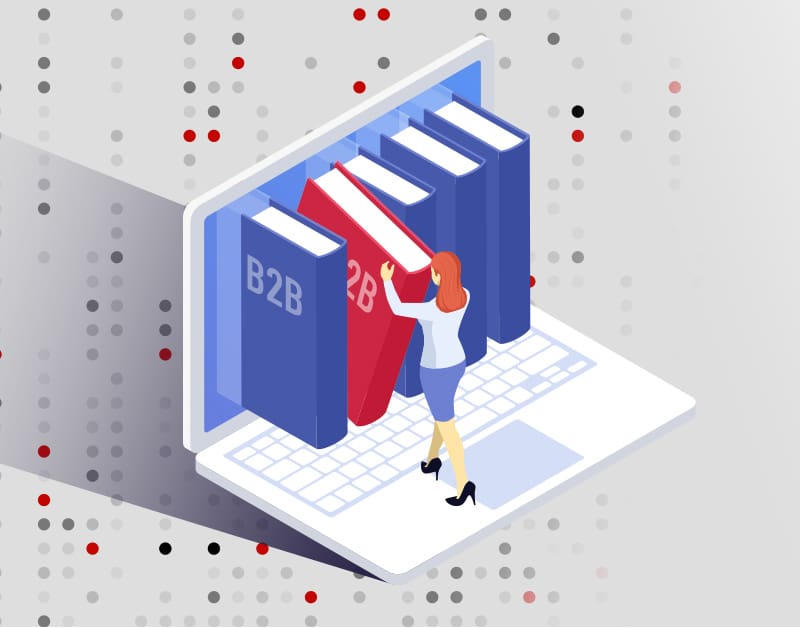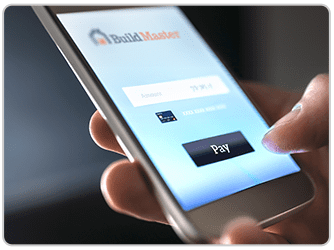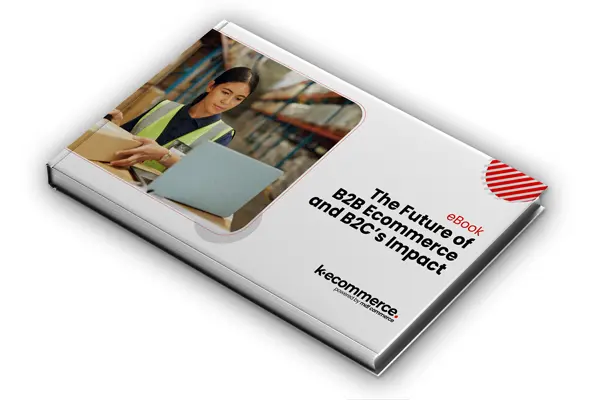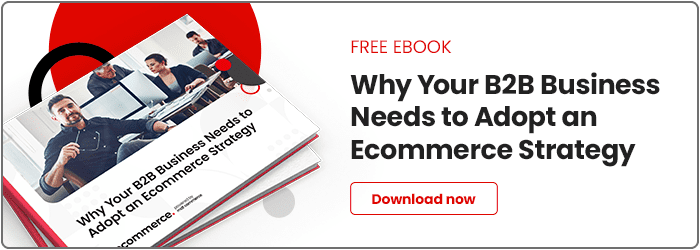
How Personalized Catalogs in B2B Ecommerce Enhance the Customer Experience

Marketing Team
k-ecommerce
Remember paper catalogs? B2B and B2C relied on mail-order catalogs for decades. While paper catalogs have fallen out of favor, they’ve undergone a digital transformation to online catalogs for B2C and B2B ecommerce.
Digital catalogs are dynamic and personalized, offering buyers customized experiences. And they need to be. After all, B2B buyers expect the same level of personalization they receive when shopping for books on Amazon or choosing a movie on Netflix.
Today, only 15% of B2B buyers find their ecommerce experiences to be extremely positive — and a large factor in their dissatisfaction is subpar (and at times non-existent) personalization efforts.
The brands getting it right? They’re often using personalized catalogs (plus personalized, customer-specific pricing to create great online experiences for B2B buyers.
Here’s why, and how.
We’ll dive deep into:
- What Value Does a Personalized Catalog in B2B Ecommerce Offer?
- What Makes the Requirements for a B2B Ecommerce Catalog Unique?
- How Personalized Catalogs Enhance the B2B Ecommerce Experience
- How To Create a Personalized Catalog for Ecommerce Websites
- Personalized Catalogs are Good for Your Ecommerce Store, Your Business, and Your Customer Relationships
What Value Does a Personalized Catalog in B2B Ecommerce Offer?

A personalized catalog for an ecommerce website is a marketing tool that showcases products in ways that appeal to the interests of individual customers.
Due to the complexity of B2B products, personalized catalogs in B2B ecommerce integrate layers of customization to account for more variables of behavior and purchasing contracts. Personalization can include a mix of account-specific pricing, volume discounts, bulk order options, and specialized product configurations. Still, even with the complexity involved, the value of personalized catalogs for ecommerce websites can’t be overstated. In fact, customized experiences turn 56% of customers into repeat buyers.
What Makes the Requirements for a B2B Ecommerce Catalog Unique?
To deliver personalized user experiences with a B2B ecommerce catalog, consider the unique requirements of the B2B buying process, such as contractual agreements and different access levels for your customer’s employees.
Unlike in B2C, B2B ecommerce catalogs need to factor in:
- Purchase volume: B2B transactions often involve bulk purchases, like a construction company ordering thousands of steel beams for construction projects.
- Complexity and customized products: B2B products, like industrial machinery, often require detailed specifications and may need to include customized options for specific customers to meet their needs.
- Pricing: B2B pricing often involves bulk discounts and contractual pricing that varies by customer. It can also include making sure pricing is based on the unit preference of the customer, such as a case or pack of items instead of an individual item.
- Payment and billing: B2B transactions require invoicing and purchase orders. Further, B2B transactions must be customized for preferred payment methods, payment terms, and include any discounts for early payment.
- Access: B2B catalogs need to offer different levels of access based on employee functions. While B2C sales are simply one person accessing and buying, B2B customers often have multiple employees accessing different parts of the process. The person ordering is unlikely to be the same person making a payment.
How Personalized Catalogs Enhance the B2B Ecommerce Experience
When executed well, personalized B2B catalogs improve customer engagement, sales, and positively influence decision-making.
Products and Terms Tailored to the Buyer
 Each B2B buyer has unique needs, preferences, and goals. To address these specific requirements, your B2B ecommerce store must offer product catalogs tailored to each buyer.
Each B2B buyer has unique needs, preferences, and goals. To address these specific requirements, your B2B ecommerce store must offer product catalogs tailored to each buyer.
That way, B2B customers won’t have to go through a barrage of product listings, search results, and purchasing options before finding what they need. The goal is to make their shopping experience as easy as possible for them.
A personalized catalog in B2B ecommerce includes essential features like:
- Customized product listings
- Agreed-upon pricing terms (e.g., unit of measure pricing or volume-based pricing)
- Buyer-specific checkout options (e.g., credit terms, online payments, and purchase orders)
- Preferred shipping, delivery, and pickup methods (e.g., expedited shipping, hot shot delivery, or pickup at store)
Fast, Convenient Online Shopping
Every purchasing decision B2B buyers make directly affects their company. And to complicate matters, they also need to consider the specific requirements of every purchase.
You can make the lives of your B2B buyers easier by giving them the convenience they crave.
A personalized product catalog offers this convenience by offering features like:
- Real-time visibility of orders and inventory
- Personalized payment terms
- Saved preferences for checkout and shipping
- Streamlined navigation (precision and filtered search, category management,
- Easy reordering (via favorites, past orders, and one-click reorders)
- Quick ordering via CSV/Excel file upload
Accurate Information for Your Buyers, All the Time
As a B2B ecommerce business, your goal is to help customers find and buy what they need with minimal effort.
 That is a challenge because B2B goods and pricing are typically complex. If you serve customers with generic, one-size-fits-all product catalogs, they may end up buying the wrong items. Those errors result in dissatisfaction, returns, or even loss of trust in your brand.
That is a challenge because B2B goods and pricing are typically complex. If you serve customers with generic, one-size-fits-all product catalogs, they may end up buying the wrong items. Those errors result in dissatisfaction, returns, or even loss of trust in your brand.
With personalized catalogs, you can help B2B customers find the exact items they need without sifting through irrelevant products and information. For example, if that customer uses model five of a specific piece of equipment, the catalog would only show accessories for model five instead of mixing in items for models one through four.
This empowers your B2B customers to make informed buying decisions, which leads to repeat business and long-term loyalty.
How To Create a Personalized Catalog for Ecommerce Websites
Personalized catalogs can undoubtedly maximize the potential of your B2B online store. But how do you set them up for your ecommerce business?
Connect to an ERP System’s API
Running a B2B ecommerce platform involves many moving parts, from order processing and inventory management to customer relationship management to supply chain logistics.

You can streamline these processes using a single platform by integrating a robust ERP (Enterprise Resource Planning) system into your B2B ecommerce platform. ERP integration enables you to leverage the wealth of data stored within the ERP solution to create customer-specific experiences or catalogs. This data includes:
- Customer data (e.g., order history, contact details, and payment terms)
- Product details (e.g., SKU, descriptions, inventory levels and location, and pricing)
With near real-time access to all that data, you can present product catalogs that make the shopping experience convenient and personalized for each buyer through features like quick reordering, bulk purchases, and account-specific catalogs.
Leverage AI and Machine Learning
AI and machine learning continue to transform how businesses engage with customers. These technologies enable B2B companies to personalize their ecommerce experience at scale. In essence, AI and machine learning use customer data to predict purchasing behavior, enabling businesses to create online shopping experiences tailored to the unique requirements and needs of their B2B audience.
Enable Self-Service
To provide a personalized experience, empowering B2B buyers to manage their purchasing journey independently is essential.
B2B self-service features play a pivotal role in this regard. By offering capabilities such as online ordering, order status tracking, invoice viewing, and delivery tracking, you allow customers to navigate their transactions seamlessly. That easy access to details enhances their experience and fosters efficiency in the buying process.
Simplify the Ordering and Reordering Process
Businesses rely on a steady supply of core materials and supplies. By implementing reorder capabilities, you empower buyers to swiftly replenish their stock with just a few clicks.
That convenience cultivates repeat business and fosters customer loyalty. Think of it as the familiar scenario of walking into your favorite coffee shop, where the baristas already know your order.
Personalized Catalogs are Good for Your Ecommerce Store, Your Business, and Your Customer Relationships
B2B buyers crave personalized experiences — and that won’t change anytime soon. Meeting this demand is essential if you want to maximize the potential of your B2B ecommerce business.
However, the complexity of B2B products requires the right tech stack to deliver these experiences. With a good product catalog integrated with the right data, you can deliver tailored experiences that keep B2B customers coming back.
With k-ecommerce’s ERP-integrated B2B ecommerce solution, you gain access to a personalized catalog that aligns with B2B buyers’ expectations. Contact us today to learn how.



